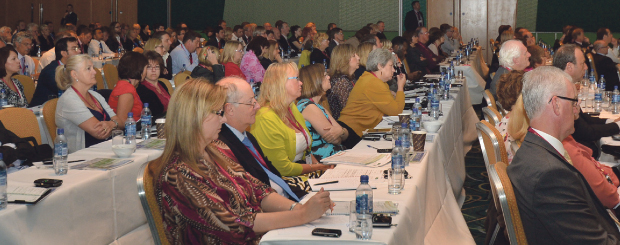L-R: Graham Hoyle OBE, AELP, Martin Dunford,OBE, AELP, Sarah Benioff, NAS, David Russell, DfE and Martin Doel, AoC
The skills minister said he had “unfinished business” with pre-apprenticeships on the first day of the Association of Employment and Learning Providers (AELP) National Conference 2012.
John Hayes MP said the government needed to provide a “better bridge” or “stepping stone” for people with little or no prior attainment.
“In understanding that bigger footprint that apprenticeships now make…we need to develop a better pre-apprenticeship product,” he said.
“We’ve done work on this…but I don’t think we’ve done enough yet.
“There do need to be new ideas, fresh thinking, about how we create that bridge.
“All the experience suggests that it needs to be flexible, it needs to be personalised, it needs to be tailored to the circumstances of the particular individual.”
Mr Hayes said he was “determined” to find a solution that would help the most disengaged and disadvantaged learners access an apprenticeship.
During his speech the skills minister said he wanted the apprenticeship programme in Britain to be one of the biggest in the world, eclipsing the schemes used by both France and Germany.
“I want to drive quality further and further upwards,” he said.
“I want apprenticeships in Britain to be the best apprenticeships anywhere in the world.
“I see no contradiction between that and the desire to grow their number further.”
He added: “We will certainly exceed the number and quality in France very soon and I believe that we will exceed both the number and standard of apprenticeships currently in Germany.
“I expect us to be the biggest and best apprenticeship provider.”
Mr Hayes said he expected there to be 500,000 new apprentices bv the end of the year, with an extra 20,000 higher apprenticeships by the end of the parliamentary term.
Day one of the AELP National Conference 2012, held at the Hilton London Metropole Hotel, focused heavily on apprenticeships and the problems facing young people.
Martin Dunford OBE, chairman of AELP, opened the event with a review of the association’s achievements over the last decade.
“We all have a job to do in properly explaining that the apprenticeship brand is one that is broad and all encompassing,” he said.
He later explained that AELP’s priorities in the future would be to continue championing learning at work, and also fight for independent information, advice and guidance in schools.
The AELP chairman said they would also be looking to improve the service that they offer members.
The other morning speakers were Sarah Benioff, a director at the National Apprenticeship Service (NAS), David Russell, director of participation and vocational education at the Department for Education (DfE), Martin Doel OBE, chief executive of the Association of Colleges and Graham Hoyle, chief executive of AELP.
Mr Doel explained how colleges, universities and schools operated on different ‘playing fields’ to private providers.
He argued that it was difficult for independent providers to operate in the same space as FE colleges until they were accountable for their local community.
“With freedom comes responsibility,” he said.
“With responsibility comes accountability, and that accountability must be to their community or the stakeholder in the communities.
“Why is that important in the supply chain? Because legitimacy, for the freedoms in the first place, comes from exercising those freedoms responsibly, being accountable to the community, and then legitimizing the freedoms that are in place.”
The afternoon sessions included speeches from Peter Lauener, chief executive of the Education Funding Agency (EFA) and Matthew Coffey, national director for Learning and Skills at Ofsted, among others.
The day was spliced with workshops – often with eight running simultaneously, where delegates could learn, network and debate more specific issues.



Your thoughts